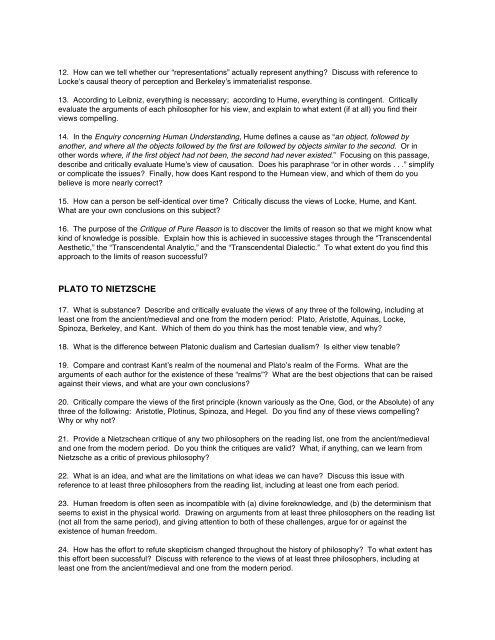Metaphysics and Epistenmology Exam Questions - Philosophy
Metaphysics and Epistenmology Exam Questions - Philosophy
Metaphysics and Epistenmology Exam Questions - Philosophy
Create successful ePaper yourself
Turn your PDF publications into a flip-book with our unique Google optimized e-Paper software.
12. How can we tell whether our “representations” actually represent anything? Discuss with reference toLocke’s causal theory of perception <strong>and</strong> Berkeley’s immaterialist response.13. According to Leibniz, everything is necessary; according to Hume, everything is contingent. Criticallyevaluate the arguments of each philosopher for his view, <strong>and</strong> explain to what extent (if at all) you find theirviews compelling.14. In the Enquiry concerning Human Underst<strong>and</strong>ing, Hume defines a cause as “an object, followed byanother, <strong>and</strong> where all the objects followed by the first are followed by objects similar to the second. Or inother words where, if the first object had not been, the second had never existed.” Focusing on this passage,describe <strong>and</strong> critically evaluate Hume’s view of causation. Does his paraphrase “or in other words . . .” simplifyor complicate the issues? Finally, how does Kant respond to the Humean view, <strong>and</strong> which of them do youbelieve is more nearly correct?15. How can a person be self-identical over time? Critically discuss the views of Locke, Hume, <strong>and</strong> Kant.What are your own conclusions on this subject?16. The purpose of the Critique of Pure Reason is to discover the limits of reason so that we might know whatkind of knowledge is possible. Explain how this is achieved in successive stages through the “TranscendentalAesthetic,” the “Transcendental Analytic,” <strong>and</strong> the “Transcendental Dialectic.” To what extent do you find thisapproach to the limits of reason successful?PLATO TO NIETZSCHE17. What is substance? Describe <strong>and</strong> critically evaluate the views of any three of the following, including atleast one from the ancient/medieval <strong>and</strong> one from the modern period: Plato, Aristotle, Aquinas, Locke,Spinoza, Berkeley, <strong>and</strong> Kant. Which of them do you think has the most tenable view, <strong>and</strong> why?18. What is the difference between Platonic dualism <strong>and</strong> Cartesian dualism? Is either view tenable?19. Compare <strong>and</strong> contrast Kant’s realm of the noumenal <strong>and</strong> Plato’s realm of the Forms. What are thearguments of each author for the existence of these “realms”? What are the best objections that can be raisedagainst their views, <strong>and</strong> what are your own conclusions?20. Critically compare the views of the first principle (known variously as the One, God, or the Absolute) of anythree of the following: Aristotle, Plotinus, Spinoza, <strong>and</strong> Hegel. Do you find any of these views compelling?Why or why not?21. Provide a Nietzschean critique of any two philosophers on the reading list, one from the ancient/medieval<strong>and</strong> one from the modern period. Do you think the critiques are valid? What, if anything, can we learn fromNietzsche as a critic of previous philosophy?22. What is an idea, <strong>and</strong> what are the limitations on what ideas we can have? Discuss this issue withreference to at least three philosophers from the reading list, including at least one from each period.23. Human freedom is often seen as incompatible with (a) divine foreknowledge, <strong>and</strong> (b) the determinism thatseems to exist in the physical world. Drawing on arguments from at least three philosophers on the reading list(not all from the same period), <strong>and</strong> giving attention to both of these challenges, argue for or against theexistence of human freedom.24. How has the effort to refute skepticism changed throughout the history of philosophy? To what extent hasthis effort been successful? Discuss with reference to the views of at least three philosophers, including atleast one from the ancient/medieval <strong>and</strong> one from the modern period.


